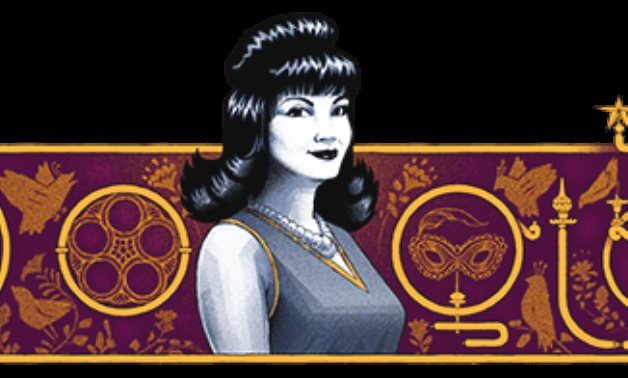
File: Shadia’s google doodle.
CAIRO – 8 February 2021: Google is honoring the iconic Egyptian singer and actress Shadia with a Google Doodle to celebrate the legendary singer’s 90th birthday.
Born in 1931 as Fatma Shaker, Shadia played various roles in movies of different genres. But in addition to her diverse roles, Shadia was also a prolific singer.
Shadia enriched the Egyptian music with about 114 songs over 37 years. Moreover, 25 years after retiring and completely disappearing from the limelight, her song “Ya Habebty ya Masr” (Egypt, My Beloved) was the voice of the January 25 uprising in 2011.
She was dubbed "Dalouet El Cinema" (Cinema’s Sweetheart) by her loyal fans from all over the Arab world. She was known for her melodious charm and light-heartedness.
Shadia started acting in 1947, at the age of 16, and was often cast in the role of a lively young girl. Then in 1953, she started to sing and to take on more dramatic roles, having just suffered the loss of her fiancé in the war.
Shadia’s marriage to actor Emad Hamdy, who was 20 years older than her, was a turning point in her career but the marriage only lasted for three years.
After their divorce, she married Fathi Aziz but also got divorced two years later.
Her last and longest marriage was t to her on-screen love interest Salah Zulfaqqar. That marriage lasted six years but ended in divorce in 1967.
More than a talented show woman, Shadia managed to encapsulate just about every issue facing the Egyptian woman, from young love and jealousy to struggling between career and family, and all the way to women’s honor, poverty, prostitution, oppression and uprising against injustice.
As time passes, we never seize to be caught off guard by cinematic sweetheart and beauty Shadia.
She gave us groundbreaking black and white movies that are prescient, even in the age of HD and 4D films.
Despite passing away, she is still a force to be reckoned with. Iconic Shadia shattered and intentionally ignored long standing taboos, touching on cringe worthy topics, making her one of Egypt’s most beloved stars.
Because her films are screened repeatedly on TV, you may never realize her unprecedented impact and how ahead of her time she truly was.
We all remember her role in “Meraty Moudeer A’am” (My Wife is the General Manager) in 1966 as a forward-thinking, savvy woman called Essmat who pins her success on her career, managing to move up the ladder.
Eventually the main character becomes her spouse’s boss and still able to keep a home-work-relationship equilibrium.
Starring Salah Zulfikar, Tawfik el-Deken and directed by Fatin abdel Wahab, the movie touches on how society looks down on women who professionally have an upper hand over their husbands.
“Al-Zoga Raqam 13” (Wife no.13) is considered one of the greatest films on the topic of polygamy and its demeaning effect on women; the movie challenges society’s long-standing notion that men have the right to treat women like toys, whose dignity and rights are negligible and whose sole purpose is to meet the pleasure of men.
It tells the story of a well-off womanizer, played by Roshdy Abaza, who is always on the lookout for a beautiful woman to marry ephemerally.
The movie was directed by Fatin Abdel Wahab and starred Shwikar along with several other notable female stars.
Shadia was Fouada in “She’ Min el-Khouf” (An Ounce of Fear) in 1969 based on the novel by Tharwat Abaza, “She’ Min el Khouf” is placed amongst Egypt’s Greatest 100 Movies, according to IMBD.
It portrays the controversial character of Atrees, played by the veteran actor Mahmoud Morsy, who follows his grandfather’s wishes and rules a poor village with a heavy hand. Atrees falls in love with Fou’ada (Shadia), who lives in the village.
He tries to marry her but she refuses due to his evil deeds.
Also, Among Shadia's most iconic roles was Soheir. The famous actress who falls in love with an extra (played by Abdel Halim Hafez) in the romantic classic “Maaboudet El Gamahir” (The People’s Idol), which also features Fouad el-Mohandes, Youssef Shaaban, Hassan Fayek and Zeinat Sedky.
After her last role in “La Tas’alni Man Ana” (Don’t Ask me Who I am), Shadia officially announced retiring in the late 1980s, turning the page of her artistic career and dedicating her life to worship and looking after her nephews and orphans, never having had children of her own.
Shadia told the media back then that she prefers that her fans remember her as the young woman they knew and doesn’t want them to see her old and wrinkled.
She has ever since remained true to that statement, having made very rare public appearances since her retirement.
Shadia starred alongside mega stars like Abdel Halim Hafez, Farid el Atrash and Kamal el-Shennawy, with whom she co-starred in more than 30 films.
Shadia passed away on Tuesday, Nov. 28, 2017 at the age of 86 after being transferred to the hospital as she suffered a brain stroke.
Comments
Leave a Comment